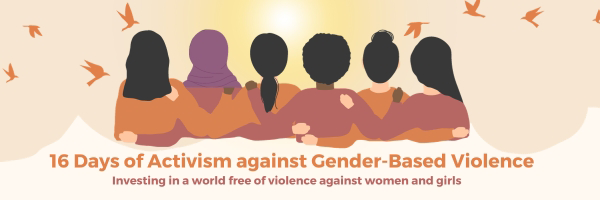
Preventing and responding to violence against women and girls in the WHO Eastern Mediterranean Region: the role of the health system
27 November 2023 – Since 1991, the 16 Days of Activism against Gender-Based Violence (GBV) campaign has run each year from 25 November, which is the International Day for the Elimination of Violence against Women, to 10 December, Human Rights Day. This global initiative calls for the prevention and elimination of violence against women and girls (VAWG). The theme for the 2023 campaign focuses on “Investing in Prevention of Violence against Women”.
Violence against women is a global pandemic, with 1 in 3 women globally (31% in the Eastern Mediterranean Region) experiencing intimate partner violence or sexual violence at least once in their lifetime. It is a human rights violation and a major public health problem, which has its roots in structural systems that maintain gender inequalities and discrimination. It prevents women and girls from realizing their full potential as members of society, resulting in loss of human capital, productivity, quality of life, and citizen welfare, leading to an overall economic loss for the country.
During emergencies of all kinds, the prevalence of VAWG increases. Displacement, broken social and protective networks, and other risk factors that arise in times of conflict, natural disasters or other crises create an environment where women and girls are at acute risk of experiencing such violence. One in 5 refugee or displaced women in complex humanitarian settings have experienced sexual violence (1). During the food crisis in Yemen, an increase in child and forced marriage was also reported (2).
Furthermore, when addressing VAWG, other risk factors must be kept front of mind. For example, women with disabilities are 2 to 4 times more likely to experience GBV than other women (3). Also, survivors of violence are 1.5 times more likely to contract HIV/AIDS (4).
Why must the health sector address VAWG?
Violence has a significant effect on women and girls’ health and well-being, causing serious short- and long-term physical, mental, and sexual and reproductive health problems.
Most women and girls attend health services, especially sexual and reproductive health services, at some point in their lives.
Evidence shows that women who have experienced violence are more likely to seek health services, though they may not disclose the violence.
Health providers are ideally placed to recognize and respond to VAWG and harmful practices such as child marriage and female genital mutilation.
The health sector is often women’s first point of professional contact after they experience GBV, and health services offer a culturally and socially appropriate entry point for survivors.
What is the health sector’s role in addressing VAWG?
The health sector must provide inclusive, survivor-centred, comprehensive health services to all women and girls who have experienced violence, including in humanitarian settings.
It must also provide first-line support for the survivors, and referral to other services as needed.
How can a health system achieve its role?
To help address VAWG, a health system must improve its accountability, access to services and quality of care by eliminating discrimination, mistreatment and violence when women and girls (including those who have been subjected to GBV) access health services (5). This requires various strengthening efforts.
1. Strengthen health system leadership and governance
Commit to address and condemn all forms of VAWG in all settings.
Allocate human and financial resources for programming and services to address GBV, and for the inclusion of these services in universal health coverage, including in humanitarian settings.
Integrate prevention and response to VAWG into health policies, plans, programmes and budgets.
Advocate to adopt or reform laws and policies to promote sexual and reproductive health and rights, and gender equality.
Improve coordination within the health sector and with other sectors.
2. Strengthen health service delivery and health providers’ capacity to prevent and respond
Improve access to services by integrating care for women experiencing violence into existing programmes and services.
Train health providers and managers and integrate training on VAWG into pre- and in-service curricula for all health professionals.
Anchor GBV interventions into emergency response and mainstream GBV and VAWG into Health Cluster workplans.
3. Strengthen programming that supports prevention
• Promote messages on gender equality, consent and respect among communities, and support prevention programmes to challenge patriarchal beliefs and social norms that perpetuate a culture of violence.
• Inform policies and programmes in other sectors about evidence-based prevention interventions that promote positive, non-violent gender norms and relationships, and that empower women and girls.
4. Strengthen the collection of information and evidence
Improve routine reporting of statistics on VAWG, as well as data synthesis, management and interpretation, to strengthen institutional capacities and scale up health system interventions to address VAWG.
1. The prevalence of sexual violence among female refugees in complex humanitarian emergencies: a systematic review and meta-analysis.
Vu A, Adam A, Wirtz A, Pham K, Rubenstein L, Glass N, Beyrer C, Singh S. PLoS Curr. 18 March 2014.
2. Yemen’s invisible food crisis: media briefing.
Oxfam; 2016.
3. Dunkle K, Heijden I, Stern E, Chirwa E. Disability and violence against women and girls. London: UKaid; 2018, cited in Global report on health equity for persons with disabilities. Geneva: World Health Organization; 2022.
4. Global and regional estimates of violence against women: prevalence and health impacts of intimate partner violence and non-partner sexual violence.
World Health Organization, London School of Hygiene and Tropical Medicine, South African Medical Research Council. Geneva: World Health Organization; 2013.
5. Global plan of action to strengthen the role of the health system within a national multisectoral response to address interpersonal violence, in particular against women and girls, and against children.
Geneva: World Health Organization; 2016.








